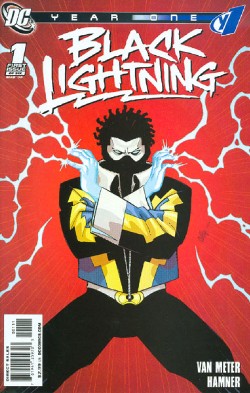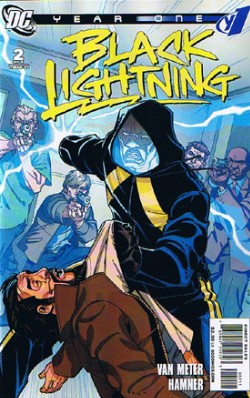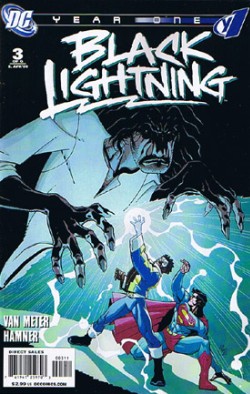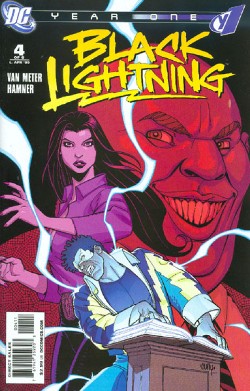2009 Comic Book News Archives

February 19, 2009: Exclusive Interview with Jen Van Meter
By Neal Bailey.Hey, folks! I had the awesome privilege of sitting down and interviewing writer Jen Van Meter, one of the rare gems in the comic book world whose work, in whole, I enjoy. If you've ever read a scathing review, you know I'm a right picky idiot, and so for me to put the 100% stamp on someone, they've gotta be awesome in every respect.
I first met Jen in Portland years ago, and she let me in on Hopeless Savages, which you're about to read her comment on, and from then on I was hooked. When her work comes out it is praised by critics and fans alike, and I quickly learned why.
She recently penned the Black Lightning: Year One series that is coming out, with issue four hitting the stands today. It's a stirring exploration and character piece that explores what one man can do in a community that needs him. It united the outward spirit of Superman with the inward realities of the city, and marries them in a story that actually answers the question, and well, of why Superman can't be everything for everyone despite being Superman.
It also guest stars our favorite hero, so be sure and go ahead and pick up the mini. I don't often shill, point of fact most of the time I condemn, but I'm proud to point you in the direction of this series. It deserves to be read, and you should be reading it.
Below you'll find an excerpt from the longer interview, which you can listen to by downloading the MP3 file (32mb/1 hr 11 mins) as part of a special Radio KAL interview. The longer interview explores much more in depth the character, the perspectives presented, and it just in general was one of the best experiences I've had as a journalist.
So have at it, enjoy!
 Q: First off, let's familiarize folks with who you are and what you do. I know, but other folks may not. What is your history as a writer, what's some of the stuff you've done?
Q: First off, let's familiarize folks with who you are and what you do. I know, but other folks may not. What is your history as a writer, what's some of the stuff you've done?
A: Well, most people who know my work know the "Hopeless Savages" series of mini-series that I've done with Oni Press. That's a creator-owned project that follows a family that started with the premise of what if Sid and Nancy had not died tragically but had in fact raised up a brood of rascally children.
Q: It's awesome!
A: So that series is the thing I have done the most of. I've also done an Elseworlds for DC Comics called the Golden Streets of Gotham. That was my first big thing for them. I did a couple short stories for Flinch and Weird Western Tales, things like that, when those were running. I did a JSA: Classified arc called "Honor Among Thieves" that I was very pleased with and that got some nice reviews.
Q: That was awesome as well.
A: Thank you! I did some fill-in stuff for Outsiders. I've done...
Q: Cinnamon, right?
A: Yeah, Cinnamon El Ciclo is a mini-series about a young woman who is named after Cinnamon 1. In the DC Encyclopedia she is listed as Cinnamon 2, which is very exciting for me. I wrote something that made it into that encyclopedia! So that, and then little bits and pieces here and there other than that.
Q: What does this Black Lightning project mean to you as a character? What initially drew you to the project? What started it?
A: What started it was... I was at a convention in Toronto, I think it was, and I saw Dan Didio, and he said he wanted to have coffee with me, and he wanted me to pitch something for him. And I thought that he meant go away, come back, meet me for coffee, and pitch something. So I went away, and prepared for myself a little something about Aquaman. I should say I didn't have to prepare much because I've been pitching Aquaman forever, but I put together something and then I met him and I sort of rolled right into it and I said, "Okay, so here's the thing, Dan!" and I told him my little pitch and he looked at me and he said, "Why are you pitching at me?" and I said, "You told me to!" and he said, "No, I have something I want you to pitch." And I said, "Oh, Okay! Do you still want me to?" And he said yes, which was good. And what he was asking, he said, "We're doing these Year Ones, and I want to do a Black Lightning, what do you know about the character?" And I told him what I knew, which was mostly his more recent continuity. I said, you know, I read some of his older stuff when I was on the Outsiders and stuff, but this is what I know. So he said "I want you to go away, see if you can find some of the original material, read it, and come back and tell me what you would do." So I did, and what I saw was this guy with this really great internal strength. I felt like, you know, it's a superhero comic book so it has to have a lot of fists flying around, that's sort of the convention, right? There's a bad guy and you use force to stop it. And yet I felt like there was an awful lot going on inside the guy that was really compelling. The very first thing that I ever read of him was that... I can remember at that time, and still I don't remember seeing anything of this before, but, I think it's in Batman and the Outsider number one which would have been I guess mid-eighties...
 Q: Yeah, I think. Like 1987? [Neal note, it's 1983. I was WAY off! Whoa!]
Q: Yeah, I think. Like 1987? [Neal note, it's 1983. I was WAY off! Whoa!]
A: Whenever that came out. I remember reading it, and Jeff shows up. He's in civilian clothes, he's in street clothes, and he's thinking about some near-miss or something that has happened that has made him feel responsible for somebody's death. He's got blood on his hands somehow, in his own mind. Clearly not so much that Batman won't work with him. But he's judged himself and found himself wanting, and he doesn't want to put on the suit back on if he doesn't have to.
Q: Now is this the young man at the school?
A: No. It turns out later, I learned later that in an earlier appearance in continuity... so maybe in some issues of something else, I'm not sure, I can't remember precisely where, but previously in the character's continuity there had been a shootout or a gunfight and he had been unable to protect a civilian, and someone had gotten shot that way, what do you call it, a ricochet. So as a result, he's kind of gone, "I'm not good enough. If I put on a suit that's a declaration that you're good enough to do this and do it right every time and I'm not and I can't."
But the very fact that that's what he was thinking about really affected me and had always sort of drawn me to the guy when I would see him. So then when I went back and read his original, the first eleven or so issues, I suppose that affected what I brought to it. But I really saw him as a character who was constantly sort of trying to determine if he was good enough to please himself, and the fact that he's an Olympian, that he's an athlete, makes a lot of sense to me there, because I think that you get a psychology that says it's not about whether or not I beat those other guys, it's about whether or not I did my personal best. It's always about whether or not I satisfied my own standards of good.
Q: It's kind of like a healthy version of Batman's obsession.
A: In a lot of ways, yeah. I mean, I think that he's... I thought a lot about how there's kind of an interesting spectrum for me. I said, here's Batman, who doesn't much care for being Bruce Wayne. Bruce Wayne is actually the mask that he puts on to do his job, right, but he is Batman. And at the other end of it is Superman, and Superman is a mask that Clark Kent puts on. He's Clark. That's who he is. And I think that he in many ways is more comfortable when he's Clark.
 Q: That's absolutely my theory.
Q: That's absolutely my theory.
A: So one of them, the superhero is the costume, and the other one, the average guy, such as you are when you're Bruce Wayne, is the costume, and I think that Jeff would rather be Jeff than Black Lightning. At the same time, I think there's a certain liberty for him in Black Lightning, because when you are say, a high school principal, when you leave your home as the only local hero your town has ever had as an athlete, when people are looking up to you... He wants to be Jefferson Pierce. Everybody he knows looks at Jefferson Pierce and says "That guy, he's the finest educator we've got, and he's a terrific athlete, my goodness, look at that guy!" And that guy starts becoming, it becomes very hard to... your standards for that guy get very, very high, and there are ways I think that Black Lightning as a character can lose his temper every once in a while, or be angry.
Q: ...take off the kid gloves. You have to take two kids that are fighting and push them apart gently, whereas Black Lightning can throw them back and say, "What are you thinking?"
A: Yeah. I think there's a certain amount of liberty in the costume for him that doesn't really compare for Superman. I think Superman probably has more liberty when he's Clark, right? He's more free to be who he is when he has the cape on. And I think Black Lightning, it at least liberates him to be... it's a different kind of emotional quality. I think, that's the best way I can put it anyway. I think that Jeff Pierce is a guy who keep a lot inside in order to be there for others. And Jeff... Black Lightning doesn't have to restrain as much, maybe.
Q: Superman comic books have often had a thematic of "That place where Superman won't even go!" It's been Suicide Slums, it's been third world countries, a lot of writers tend to exploit it, I've seen. As we do this interview issue two is coming out, so I haven't read it yet even though I just looked at it before the interview, but how does Superman enter Black Lightning's world, which is a place he doesn't usually go, and what does he mean to Jefferson?
A: Well, in the original material, the conversation that happens when Superman is introduced is along the lines of, Black Lightning saying, "You know, you're up in the sky and you're too elevated to see what's going on here on the ground in Suicide Slums, and that's the difference between us." I found, as I looked through all the material, everything I could find that dealt with Suicide Slums, I kept thinking, you know, it just doesn't make sense to me that Superman wouldn't try to fix some of this. I felt that for six issues to tell the really complete story about a place that was a cesspool in Superman's backyard, there had to be a reason that Superman couldn't be the one. I thought that it was important for the iconic nature of Black Lightning that there be a reason it has to be him.
So I gave it a lot of thought, and I felt that the best and cleanest explanation for why there would be a place that Superman doesn't mess with is that there's a magic element, that there's something that he's susceptible to, that for some reason Black Lightning can overcome. He's an ordinary human guy, so he's technically no less susceptible to it than we are, more than Superman, so part of the plot is sort of about why he can rise to the occasion where Superman can only somewhat participate. He's present in the story, but a good deal of it is about why he can't be there. Well, that makes it sound like "BLACK LIGHTNING! (and why Superman's not him!)" but that's not it.
 It's more that very early on, in the first issue, somebody says, "Not even Superman comes here!" and the fact that he doesn't has something to do with what's happened to the emotional state of the people who live there. It's fairly important to the nature of the community that they feel that they've been abandoned by the rest of Metropolis so that when Black Lighting comes into their lives, it's one of the reasons that he takes on what he does, is that they need somebody so desperately to do this where no one else who should have or ordinarily would have has stepped up. The police aren't there. Superman isn't there. Who will help us? That's sort of the case for the community. Does that make sense?
It's more that very early on, in the first issue, somebody says, "Not even Superman comes here!" and the fact that he doesn't has something to do with what's happened to the emotional state of the people who live there. It's fairly important to the nature of the community that they feel that they've been abandoned by the rest of Metropolis so that when Black Lighting comes into their lives, it's one of the reasons that he takes on what he does, is that they need somebody so desperately to do this where no one else who should have or ordinarily would have has stepped up. The police aren't there. Superman isn't there. Who will help us? That's sort of the case for the community. Does that make sense?
Q: It's got a very strong community feel. I look at it, and I was looking at how you've got Black Lighting's area, which is the place that has no hope, and wherever Superman is there is hope, so if Superman was there it'd be almost contradictory.
A: Right. And it seemed to me that one of the things that I'd read over the years when people talked about Black Lighting was always, why doesn't Superman clean up Suicide Slums? And I thought, well, if we answer that quickly and move on, or if we answer that as part of our story, because I think one of the things that makes a hero iconic is that they're part of a bigger picture. Batman needs Gotham and Gotham needs Batman. Superman belongs to Metropolis and Smallville. They are his places even if he can go everywhere. And I thought if Suicide Slums and Black Lightning are inextricably linked, it's got to be individualized, I think, because otherwise you get sort of a blaxploitation, "Only Shaft can save the ghetto!" kind of element, which is really uncomfortable, I think, now.
For more, listen to the full interview by downloading the MP3 file (32mb/1 hr 11 mins).
2009 Comic News
Listed below are all the Comic News items archived for 2009.- January 7, 2009: Final Crisis #7 to Contain Seven Extra Pages
- January 7, 2009: Liefeld Recalls Defunct Superman/Youngblood Crossover
- January 9, 2009: Andrew Kreisberg Talks “World of New Krypton”
- January 9, 2009: Dan DiDio Talks “Adventure Comics” and “Trinity”
- January 12, 2009: A Racially Diverse Krypton
- January 15, 2009: Geoff Johns Looks Ahead Beyond “New Krypton”
- January 15, 2009: Greg Rucka Talks “Action Comics”
- January 16, 2009: “Final Crisis #6” Gets 2nd Printing
- January 20, 2009: Kurt Busiek Talks “Trinity”
- January 27, 2009: Colorist Explains Coloring Error in “Trinity #34”
- January 28, 2009: Grant Morrison Talks “Final Crisis”
- January 28, 2009: Denny O'Neil Audio Interview
- January 29, 2009: Superman in “Final Crisis #7” Really President Obama?
- January 29, 2009: Dan Didio Talks About “What's New in the DCU”
- January 29, 2009: Superwoman Speculation/Replacements for Superman Pondered
- January 31, 2009: “Trinity” Colorist Discusses Colorist's Responsibilities
- February 3, 2009: Lex Luthor & Power Girl in “Batman: The Brave & the Bold #1”
- February 4, 2009: Grant Morrison Talks with IGN
- February 4, 2009: Grant Morrison Cancels NYC Comic Con Appearance
- February 4, 2009: Rucka & Robinson Writing World of New Krypton Series
- February 5, 2009: Grant Morrison Talks “Final Crisis” on Newsarama, Part Two
- February 5, 2009: Dan Didio Answers 20 Questions About the DCU
- February 5, 2009: Kreisberg Explains Departure From “World of New Krypton”
- February 6, 2009: Action Comics #1 on Display at NY Comic Con
- February 6, 2009: Video Interview with Superman Editor Matt Idleson
- February 6, 2009: Superman Panels at NY Comic Con
- February 7, 2009: Johns and Manapul on “Adventure Comics”
- February 9, 2009: Superman News from New York Comic Con
- February 10, 2009: NYCC - Superman “Building a Better Tomorrow” Panel
- February 10, 2009: NYCC - “DC Universe Online” Panel
- February 19, 2009: Exclusive Interview with Jen Van Meter
- February 19, 2009: Dan Jurgens Talks “Tangent: Superman's Reign”
- February 19, 2009: Jamal Igle Talks Supergirl and Superwoman
- February 23, 2009: Geoff Johns Talks Superman Comics
- February 25, 2009: Rucka & Robinson Talk “Superman: World of New Krypton”
- February 28, 2009: DC Nation Panel at Wondercon 2009
- March 1, 2009: Exclusive Interview with Ian Sattler
- March 1, 2009: DC Comics Releases “World of New Krypton” Video Trailer
- March 2, 2009: DC Universe Panel at WonderCon 2009
- March 6, 2009: Superman Makes NY Times Best Seller List
- March 10, 2009: Wizard's Top 25 “Dynamic Duos”
- March 12, 2009: Superman Appears in “Batman: The Brave and the Bold #2”
- March 19, 2009: Dan DiDio Answers Questions About Superman Comics
- March 25, 2009: Greg Rucka Talks “Action Comics”
- April 8, 2009: DC Nation - Emerald City ComiCon
- April 10, 2009: Washington Post Interviews Dan DiDio
- April 15, 2009: DC Makes Changes to JLA #34
- April 17, 2009: First Look at Wednesday Comics “Superman”
- April 21, 2009: Rags Morales Talks “Justice League of America”
- April 30, 2009: Kurt Busiek Talks “Trinity”
- May 1, 2009: DC Comics Sneak Peek at “Adventure Comics”
- May 2, 2009: Free Comic Book Day Signings
- May 5, 2009: Andrew Robinson Talks Covering Superman Comics
- May 6, 2009: Julian Lopez Takes Over “Action” Art Duties
- May 8, 2009: Another Look at “Wednesday Comics” Superman
- May 8, 2009: Poll Position - Motion Comics
- May 13, 2009: Dan DiDio Discusses Up-Coming DC Comics
- May 14, 2009: James Robinson - Writer Without a Superman
- May 14, 2009: “Blackest Night: Superman #1” Cover Revealed
- May 16, 2009: Robinson and Rucka on Superman “Codename: Patriot” Saga
- May 16, 2009: James Robinson Talks “Justice League: Cry For Justice”
- May 16, 2009: Sterling Gates and Jamal Igle Talk Supergirl
- May 19, 2009: Exclusive “Supergirl: Cosmic Adventures in the Eighth Grade” Interview
- May 19, 2009: Gary Frank Talks “Superman: Secret Origin”
- May 20, 2009: Gatefold Cover For Final “Trinity” Issue
- May 21, 2009: Jamal Igle Talks Supergirl and More
- May 21, 2009: Top 100 Comic Book Villains of All Time
- May 30, 2009: A Day in the Life of Matt Idelson
- May 30, 2009: Dwayne McDuffie Fired From JLA Comic
- June 2, 2009: Five Page Preview of “Justice League: Cry For Justice”
- June 3, 2009: Sneak Peek at Superman vs Flash in “Flash: Rebirth #3”
- June 9, 2009: Renato Guedes Superman and Supergirl Annual Comic Covers
- June 12, 2009: Gail Simone Interview from Superman Celebration
- June 13, 2009: Sneak Peek at “Action Comics Annual #12”
- June 16, 2009: USA Today to Publish “Wednesday Comics” Superman Strip
- June 18, 2009: A Sneak Peek at “Superman #689”
- June 19, 2009: Robinson and Bagley Taking Over JLA Duties
- June 19, 2009: Dan DiDio on “Wednesday Comics” Deal with USA Today
- June 20, 2009: DC Universe Panel at Heroes Con 2009
- June 23, 2009: Check Out the “Adventure Comics #3” Cover
- June 27, 2009: A Day In The Life of Matt Idelson
- June 27, 2009: Jamal Igle Talks Supergirl Shorts
- July 2, 2009: Dan DiDio Talks “Superman: Secret Origin”
- July 3, 2009: DC Comics Panel Schedule for San Diego Comic-Con
- July 3, 2009: Justice League to Meet The 99
- July 8, 2009: USA Today Publishes First “Wednesday Comics” Superman Strip
- July 15, 2009: USA Today Publishes Second “Wednesday Comics” Superman Strip
- July 16, 2009: Jimmy Palmiotti Talks Supergirl “Wednesday Comics” Strip
- July 22, 2009: USA Today Publishes Third “Wednesday Comics” Superman Strip
- July 24, 2009: Exclusive Coverage of “Superman: Two Worlds” Panel
- July 24, 2009: San Diego Comic-Con 2009 Reports
- July 24, 2009: “Superman: Red Son” Motion Comic Online
- July 25, 2009: DCU Online Panel Exclusive Report From SDCC
- July 26, 2009: Superman News in Newsarama Live Coverage of DC Universe: Editorial Presentation
- July 28, 2009: Lee Bermejo Talk Superman “Wednesday Comics” Strip
- July 28, 2009: “All Star Superman” Wins Eisner Award
- July 29, 2009: USA Today Publishes Fourth “Wednesday Comics” Superman Strip
- July 29, 2009: J. Michael Straczynski Writing Superman Comic?
- August 5, 2009: USA Today Publishes Fifth “Wednesday Comics” Superman Strip
- August 5, 2009: Prime Yourself for an “Adventure Comics” Comeback
- August 5, 2009: Sterling Gates Talks “Supergirl” Comics
- August 8, 2009: Francis Manapul at Wizard World Chicago Comic Con
- August 8, 2009: “Superman: Red Son” Motion Comic
- August 11, 2009: Matt Idelson Talks “Codename: Patriot”
- August 11, 2009: James Robinson Talks Superman and JLA Comics
- August 12, 2009: USA Today Publishes Sixth “Wednesday Comics” Superman Strip
- August 14, 2009: First Look at “Superman: Secret Origin #1”
- August 19, 2009: USA Today Publishes Seventh “Wednesday Comics” Superman Strip
- August 19, 2009: Diamond's Industry-Wide Skip Week in December
- August 21, 2009: Amanda Conner Talks Supergirl “Wednesday Comics” Strip
- August 25, 2009: Dan DiDio Talks Superman in 2010
- August 26, 2009: USA Today Publishes Eighth “Wednesday Comics” Superman Strip
- September 2, 2009: USA Today Publishes Ninth “Wednesday Comics” Superman Strip
- September 9, 2009: Francis Manapul on Drawing “Adventure Comics”
- September 9, 2009: Superman Comic Book Covers in December
- September 9, 2009: USA Today Publishes Tenth “Wednesday Comics” Superman Strip
- September 10, 2009: More Pages from “Superman: Secret Origin #1”
- September 15, 2009: DC to Overhaul “Superman/Batman” Comic Book
- September 16, 2009: USA Today Publishes Eleventh “Wednesday Comics” Superman Strip
- September 17, 2009: Arcudi & Bermejo Talk Superman “Wednesday Comics” Strip
- September 19, 2009: Inside the Superman Offices with Matt Idelson
- September 23, 2009: USA Today Publishes Final “Wednesday Comics” Superman Strip
- September 25, 2009: James Robinson on JLA's New Roll Call
- September 25, 2009: Poll Position - Wednesday Comics
- September 29, 2009: Dan DiDio Talks “Adventure Comics”
- September 30, 2009: Chuck Kim Talks “JLA 80-Page Giant”
- October 6, 2009: Dan DiDio Talks Superman Comics
- October 10, 2009: Trautmann Talks “Action Comics”
- October 12, 2009: Superman & Supergirl News from Baltimore Comic-Con
- October 14, 2009: DC Announces “Wednesday Comics” Collected Edition
- October 15, 2009: Jamal Igle Talks Supergirl, Superman and World's Finest Comics
- October 24, 2009: Superman vs The Flash “To The Finish Line!”
- October 27, 2009: Dan DiDio Talks “Adventure Comics”, Annuals and More
- October 28, 2009: “Superman vs. Muhammad Ali” To Get Reprint?
- October 29, 2009: Sterling Gates Talks “World's Finest”
- October 31, 2009: A Look at Up-Coming Superman Comics with Matt Idelson
- October 31, 2009: An Interview with Paul Levitz About Writing Comics
- November 7, 2009: Comic Books Good for Children's Learning
- November 13, 2009: Geoff Johns Guest of Honor at Chicago Comic Expo
- November 18, 2009: More Krypto in Superman Comics?
- November 18, 2009: Joe Kubert Artwork For Sale
- November 24, 2009: J. Bone “Super Friends” Interview
- December 5, 2009: “Adventure Comics #8” & the Future of Superman Comics
- December 8, 2009: DC Announce Earth One Superman in 2010
- December 8, 2009: J. Michael Straczynski Talks “Superman: Earth One”
- December 8, 2009: Sterling Gates Talks “World's Finest” and “Supergirl”
- December 9, 2009: “War of the Supermen” Begins in 2010
- December 9, 2009: Matt Idelson Talks “War of the Supermen”
- December 9, 2009: Shane Davis Talks “Superman: Earth One”
- December 10, 2009: “All Star Superman” Amongst Best Comics of the Decade
- December 11, 2009: Marc Guggenheim to Write “Action Comics” in 2010
- December 12, 2009: Marc Guggenheim Talks “Action Comics”
- December 15, 2009: Matt Idelson Talks Superman Comics
- December 15, 2009: Marc Guggenheim Springs Into Action
- December 16, 2009: Check Out the Cover to JLA #43
- December 18, 2009: The Last Stand of New Krypton
- December 19, 2009: J. Michael Straczynski Talks “Superman: Earth One”
- December 24, 2009: “Superman vs. Muhammad Ali” Reprint Confirmed
- December 31, 2009: Government Comics Archive Online
Back to the News Archive Contents page.
Back to the Latest News page.
